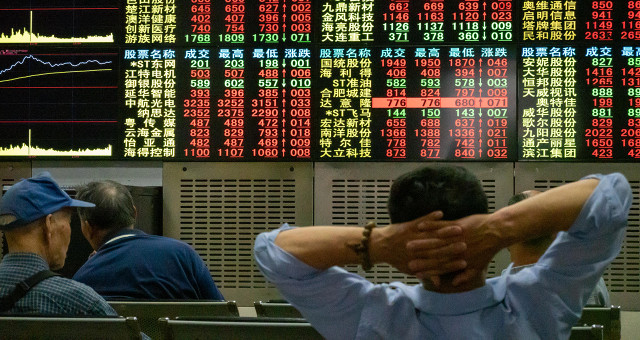

By Laura Silver, Kat Devlin, and Christine Huang
Introduction
Overview
China has emerged as a global economic superpower in recent decades. It is not only the world’s second largest economy and the largest exporter by value, but it has also been investing in overseas infrastructure and development at a rapid clip as part of its Belt and Road Initiative. A new Pew Research Center survey finds that, particularly in emerging markets, publics largely have a positive view of China’s economic stature. People generally see China’s growing economy as a good thing for their country and believe China is having a predominantly positive influence on their country’s economic affairs.
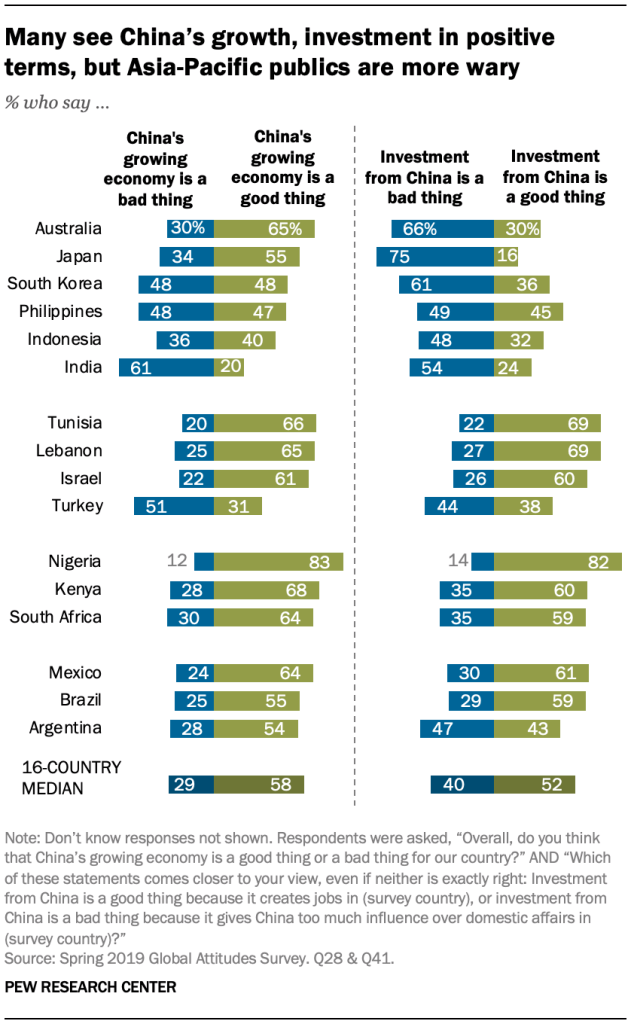
But, even while China’s rise is largely perceived as positive in emerging economies, there are pockets of discontent. First, even in the nations that welcome China’s economic growth, few feel similarly about its growing military might. Rather, most tend to view China’s growing military as something bad for their own countries. Second, China’s neighbors generally take a much more negative stance toward China’s military and economic growth than other countries surveyed. For example, in the Asia-Pacific region, more tend to see investment from China as a potential liability, giving Beijing too much influence over their economies. These same countries are also more likely than others to see U.S. economic influence in their country positively. And, when it comes to developed countries, views of China are much more mixed to negative. Generally, countries with stronger human rights records and lower levels of corruption tend to be much less keen on China.
When it comes to comparisons with the United States, generally speaking, China’s economic influence is seen in similar or even slightly more positive terms. Most publics are about equally sanguine about the state of their country’s bilateral economic relations with China and the U.S. Majorities in most nations also say both the U.S. and China have a great deal or a fair amount of influence on their country’s economic conditions. But, when rating that influence, more people say China’s is positive than say the same of the U.S.
More still name the U.S. as the foremost economic power than say the same of China. For example, across every country surveyed in Latin America and sub-Saharan Africa, as well as many in the Asia-Pacific, people name the U.S. as the top economy. In the U.S., by a 50%-32% margin, Americans name their own country as the leading economic power, though there are stark partisan differences in these evaluations, with Republicans and Republican-leaning independents being more likely to name the U.S. than Democrats.
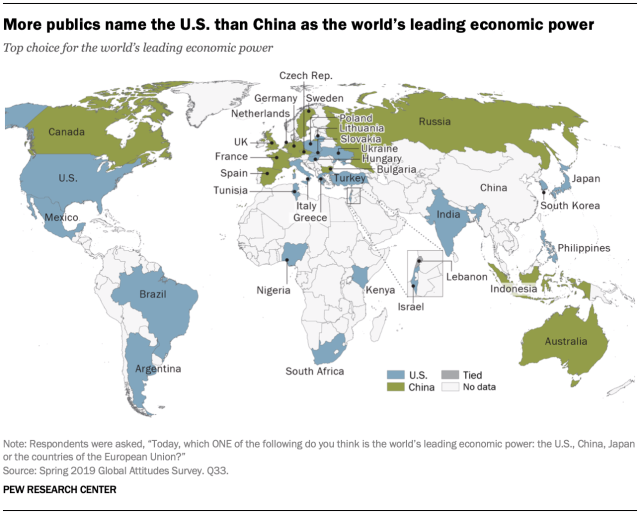
Most also prioritize relations with the United States – though this opinion is colored by perceptions of which economy is stronger. People who name the U.S. as the world’s leading economy are more likely to prefer strong economic ties with the U.S., and the opposite is true when it comes to China. And, when it comes to alliances, many more name the U.S. as the top country their nation can rely on than China.
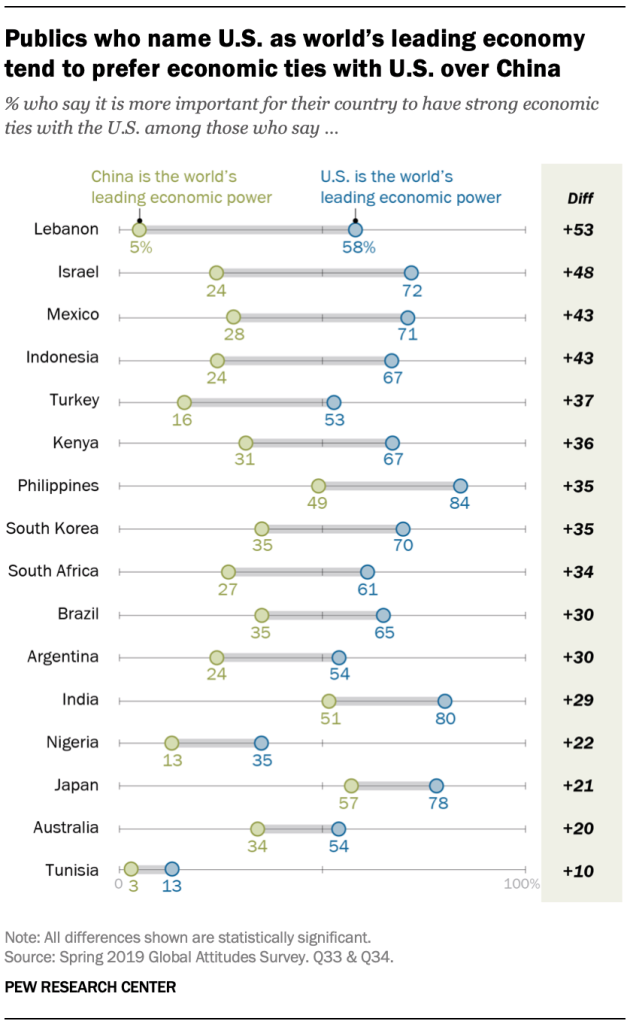
These are among the major findings from a Pew Research Center survey conducted among 38,426 people in 34 countries from May 13 to Oct. 2, 2019.
More countries see U.S. as a top ally than China
In many countries surveyed, the United States is viewed as an important ally. In Israel, 82% name the U.S. as the country they can most rely on as a dependable ally in the future. Across the Asia-Pacific region, around two-thirds or more cite the U.S. as a top ally in Japan (63%), the Philippines (64%) and South Korea (71%). In fact, in every country surveyed, more name the U.S. than China – though opinion is relatively divided in several countries.
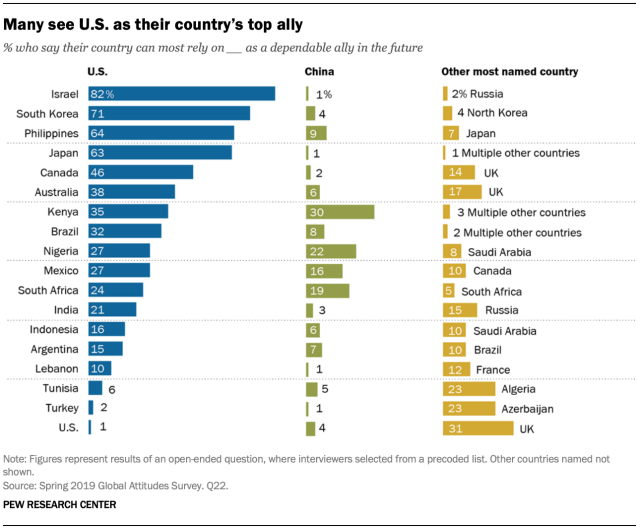
When it comes to which countries are most threatening, though, both the U.S. and China emerge as top concerns across the publics surveyed – though largely in different regions. Across many of the Latin American as well as Middle East and North African countries surveyed, more name the U.S. as a top threat than say the same of China. The opposite is largely true in the Asia-Pacific countries, where many more name China as a top threat, including 40% of Australians, 50% of Japanese and 62% of Filipinos. These countries are also among those that are most likely to say China’s growing military is a bad thing for their country – though a median of 58% across the 18 countries polled generally see downsides to a strengthening Chinese military. (For more on this, see “U.S. is seen as a top ally in many countries – but others view it as a threat.”)
Most say economic relations with the U.S. and with China are positive
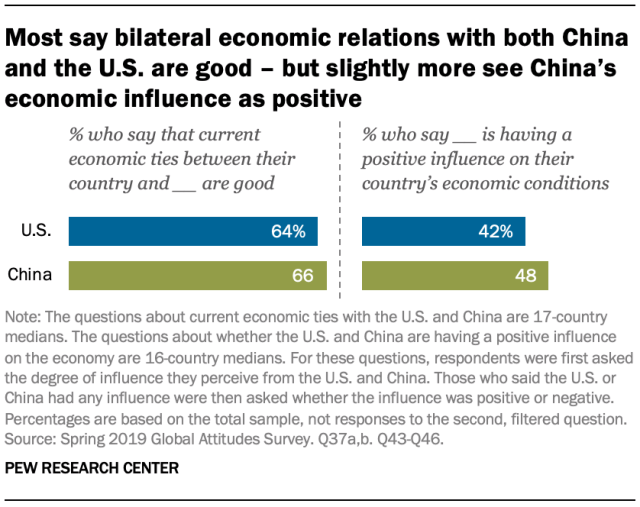
Across 17 countries, a median of 66% say their country’s current economic relations with China are good. Similarly high numbers (a median of 64%) also rate current U.S. economic relations with their countries favorably. In fact, in most countries polled, majorities say current relations with each of the superpowers are good. For example, 85% in Australia say U.S.-Australian economic relations are in good shape, while 80% say the same of Sino-Australian ones.
In several countries people are likely to evaluate current economic relations with one superpower positively, while seeing the other in more negative terms. One such country, Canada, is currently embroiled in trade tensions with China; people there evaluate current economic relations with China 20 percentage points less positively than those with the U.S. (even as trade negotiations over the USMCA continue on). Countries on China’s periphery – including the Philippines, South Korea and Japan – also view current economic relations with the U.S. much more positively than relations with China. In some of the Middle East and North African countries surveyed, the opposite is true. For example, only 42% of Lebanese say current economic relations with the U.S. are good, compared with 82% who say the same of China.
When it comes to whether the U.S. or China is having a positive or negative influence on each country’s economic conditions, though, publics on balance are somewhat more approving of China’s impact. A median of 48% say China is having a positive impact on economic conditions in their country, compared with 42% who say the same of the U.S.
In Latin America, sub-Saharan Africa and the Middle East and North Africa, more tend to rate China’s influence positively than say the same of the U.S. – even in countries where both countries’ roles are seen positively overall. One such example is Nigeria, where 69% say China’s economic influence is positive and 49% say the same of the U.S. Most Asia-Pacific countries, however, tend to say American economic influence is more positive than China’s.
International views of China vary greatly, colored by economic attitudes
Global views of China are, on balance, mixed. A median of 40% across 34 countries surveyed have a favorable view of China, while a median of 41% have an unfavorable view. But opinion varies considerably across the nations surveyed, from a high of 71% in Russia to a low of 14% in Japan.
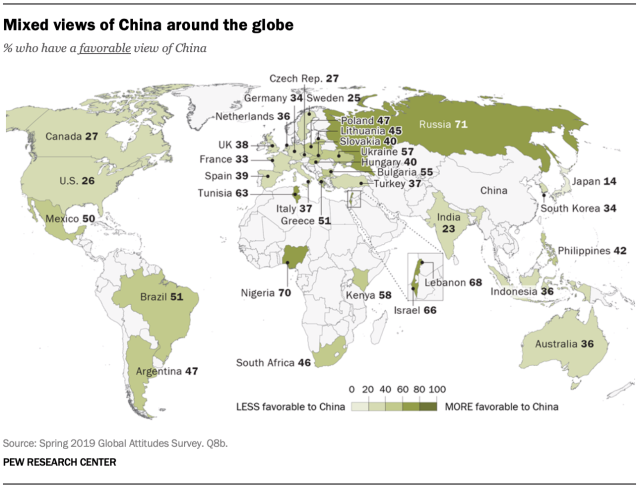
Among a subset of 15 countries that were asked questions about global economic engagement in general and Chinese investment in particular, statistical modeling results indicate that views of China are related to these economic attitudes (for a more detailed explanation, see Appendix).
Views of China’s economic strength play a role in overall evaluations of China. Generally speaking, saying that China is the world’s leading economic power, that China’s growing economy is good for one’s own country, that current bilateral economic relations with the superpower are in good shape or that China’s economic influence is good for one’s country is associated with more positive views toward China, holding other factors constant. But having a higher percentage of imports coming from China is related to more negative views of China.
Greater economic satisfaction and openness to international investment are also related to more favorable views of China. Those who are more satisfied with their own domestic economy tend to have more positive opinions of China. Additionally, those who see it as a good thing when foreign companies buy domestic companies in their country or when foreign companies build domestic companies in their country tend to be more positively disposed toward China.
Few express confidence in President Xi
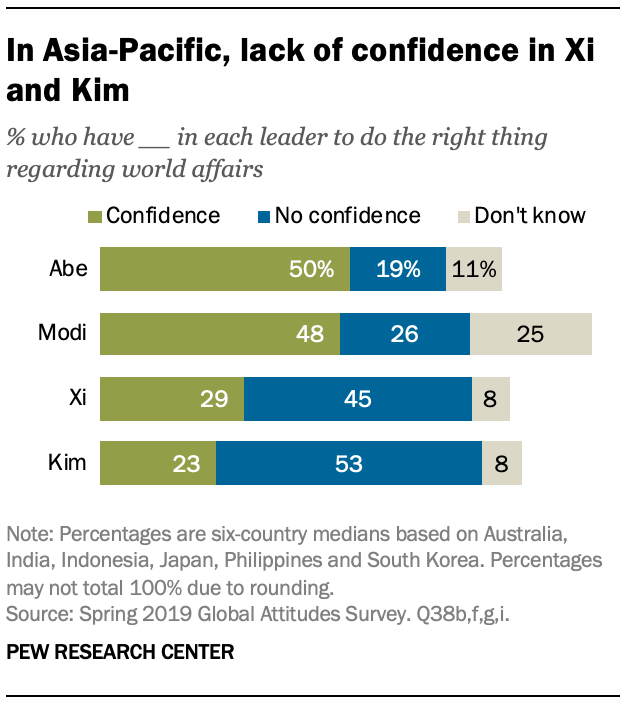
Views of Chinese President Xi Jinping are, on balance, negative across the 34 countries surveyed. A median of 45% say they lack confidence in him when it comes to world affairs, compared with a median of 29% who say they trust him to do the right thing. But opinions vary widely across regions. In the U.S., Canada and Western Europe, half or more in almost all countries say they have no confidence in Xi, whereas confidence is much higher in all three sub-Saharan African countries surveyed and tends to be higher in several of the Middle East and North African countries surveyed.
In the six Asia-Pacific countries surveyed, most have little confidence in Xi Jinping when it comes to world affairs. Just 29% have confidence in him to do what is right, which falls far short of the ratings for Japan’s Shinzo or India’s Narendra Modi. And in the Philippines, Indonesia, India and South Korea, nearly equal numbers have confidence in North Korean leader Kim Jong Un as in Xi.
Still, positive opinions of Xi have increased in many countries over recent years. Just since 2018, for example, confidence in him has increased markedly in Italy (up 10 percentage points), Mexico (up 13 points), Spain (+13) and Argentina (+14). Only in South Korea has confidence in him fallen by double digits since 2018, decreasing 12 points.
Regional spotlight: Asia-Pacific stands out for more negative attitudes toward China, its role
People in the Asia-Pacific region are generally negative in their views of China, and attitudes in many surveyed countries there have grown more negative in recent years. These countries are more critical of investment from China. Roughly half or more in each Asia-Pacific nation surveyed say Chinese investment is a bad thing because it gives China too much influence, ranging from 48% of Indonesians to 75% of Japanese. South Korea and Indonesia stand out as two countries in which fewer today see benefits from China’s growing economy than said the same five years ago.
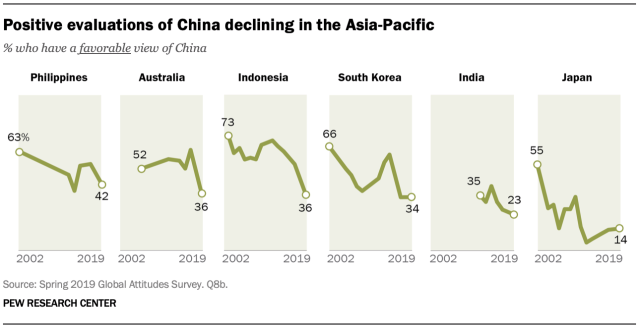
China’s neighbors are especially wary of its military growth. A median of 79% across the region say China’s growing military strength is bad for their country, including nine-in-ten in Japan and South Korea. This depth of concern with China’s growth is mirrored in the relative primacy these countries place on their relations with the United States. In each country in the region, more name the U.S. as their most dependable ally than any other country in an open-ended question, including around two-thirds or more in Japan (63%), the Philippines (64%) and South Korea (71%). Each country in the region also prefers strong economic ties with the U.S. (a median of 64%) rather than China (26%) – and often by a wide margin. In Australia and South Korea, this is a reversal of 2015 opinion, when more preferred close economic relations with China.
Views of the Balance of Power between the U.S. and China
Overview
The United States is named as the top economic power in 21 of the 34 countries surveyed, while China is considered the top economy in 12 (the U.S. and China are tied as top economic power in Lebanon). Still, publics are relatively divided, as no more than half name either country as the top economy in most countries. And few consider Japan or the countries of the European Union as the leading economic power.
Generally, most non-European countries see the United States as the world’s leading economic power, while those in Europe tend to name China. For example, in the Asia-Pacific countries surveyed, a median of 46% say the U.S. is the top economy, while a 25% median say the same about China. Across many of these countries, too, there is little ambiguity about which country is dominant, with double-digit differences between the shares who choose the U.S. and who choose China as the top economy. This is most extreme in South Korea, where there is a 70 percentage point difference between those who cite American economic supremacy (82%) and Chinese dominance (12%). South Koreans are also more likely to name the U.S. as the world’s leading economy this year compared with last year (up 15 percentage points). Within the region, Indonesians and Australians stand out for being more likely to choose China as the leading global economy, though Indonesians are somewhat divided (21% U.S., 24% China) and about as many of them name Japan (22%) as the leading economy.
Across the Middle East and North Africa, majorities or pluralities consider the U.S. to be the world’s leading economy. In Israel, six-in-ten hold this view, and about half say the same in Turkey and Tunisia (49% and 47%, respectively). The U.S. and China are tied in Lebanon, with a third naming each as the top economy. In Tunisia and Israel, the belief that the U.S. is the dominant economic power grew by double digits from 2018 (up 12 and 10 points, respectively).
Likewise, more see the U.S. than China as the top economy in all three sub-Saharan African countries surveyed, though the publics are largely divided. In Nigeria and South Africa, the tendency to name the U.S. is a departure from last year, when more in both countries named China as the world’s top economic power.
The U.S. remains the top choice for all three Latin American countries surveyed. However, roughly a third still name China as the top economy in Mexico and Argentina, and this share has gone up by 6 percentage points in Argentina since 2018.
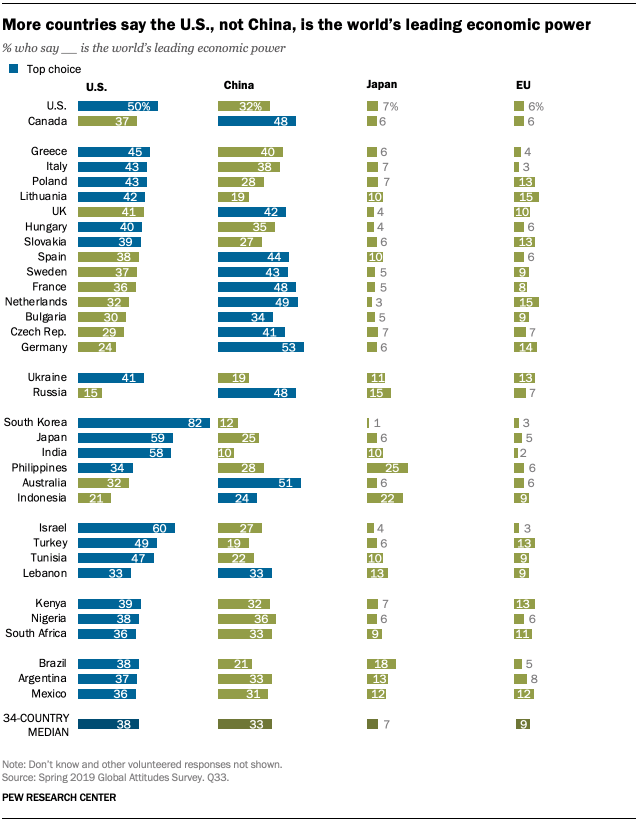
Only in Europe do more countries name China as the world’s leading economy. A median of 41% across the 14 EU member nations surveyed name China, compared with a median of 39% who say the same about the United States. China’s lead over the U.S. is especially clear in Germany, the Netherlands, the Czech Republic and France, where people are at least 10 percentage points more likely to see China as the leading economy. In France, the share that views China as the top economic power has increased by 7 percentage points since 2018, flipping the top choice from the U.S. to China. Spaniards, Swedes and Bulgarians are more muted, with about 5-point differences in their evaluations of the two economies. Those in the UK are about equally likely to point to China or the U.S. as the top economy (42% vs. 41%). In five European countries that have consistently been asked which economy is strongest over the past decade – France, Germany, Spain, the UK and Poland – China has come out on top more often than not.
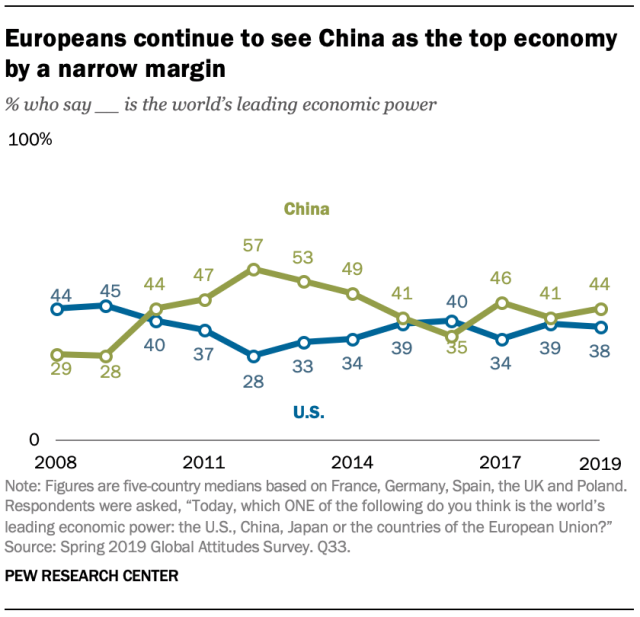
Still, Lithuanians are 23 percentage points more likely to see the U.S. as the top economy. Poles and Slovaks are also at least 10 points more likely to choose the U.S. over China. Greeks, Italians, and Hungarians similarly evaluate the U.S. economy as more powerful than the Chinese economy, but by a slimmer margin (5 points in all three countries).
Opinions in Russia and Ukraine are divided. Ukrainians say the U.S. is dominant by a margin of 22 points, while Russians choose China by 33 points. For Russians, this is a 14-point increase in the share who chose China in 2018, and a continuation of a steady upward trend in the share that see China as the world’s leading economy.
Majorities in most countries see both U.S. and China heavily influencing their domestic economies
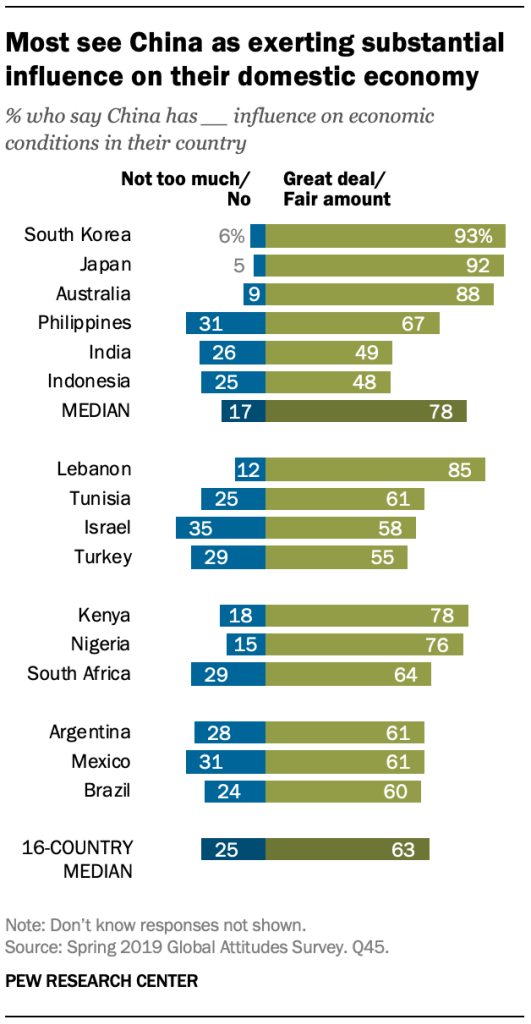
In the Asia-Pacific countries surveyed, South Koreans, Japanese and Australians are especially likely to say China has a great deal or fair amount of influence on their country’s economy, with about nine-in-ten or more holding this opinion. Lebanon also stands out in the Middle East, as 85% say China has at least a fair amount of influence on Lebanese economic conditions.
Roughly three-quarters in Kenya and Nigeria say the same, while about six-in-ten see at least a fair amount of Chinese influence on their domestic economies in the three Latin American countries surveyed.
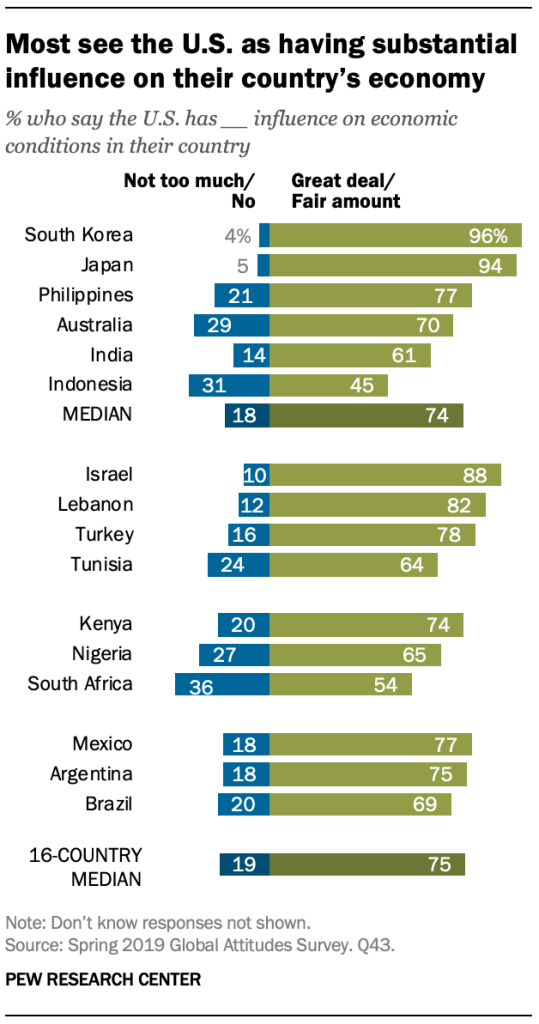
Across these same 16 countries, a median of 75% say the U.S. has a great deal or fair amount of influence on economic conditions in their country, compared with a median of 19% who say it has little or no influence.
Perceived influence is highest in South Korea (96%), Japan (94%) and Israel (88%), and lowest in Indonesia – the only country where fewer than half (45%) say the U.S. plays a large role in their economic affairs.
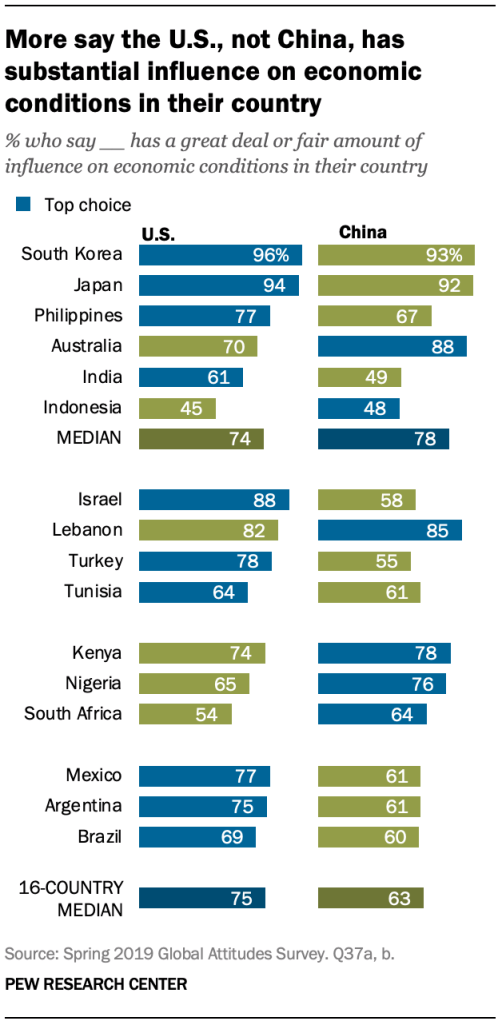
When comparing the two superpowers, by a slim margin, more people in the Asia-Pacific region say China plays a large role in their country’s economic conditions (six-country median of 78%) than say the same of the U.S. (74%). But in South Korea and Japan, upwards of nine-in-ten say both superpowers have a great deal of influence. Indians and Filipinos are about 10 percentage points more likely to see American influence on their economies, while those in Australia are 18 points more likely to see China’s muscle.
All three sub-Saharan African publics surveyed are more likely to see Chinese economic influence, with about a 10-point difference in Nigeria and South Africa. Conversely, those in Latin America are more likely to see influence from the U.S.
And, in the Middle East and North Africa, those in Israel and Turkey are more likely to identify influence from the U.S., with a difference of about 20 points or more. Those in Lebanon and Tunisia are about as likely to say the U.S. or China have a great deal or fair amount of influence.
More describe Chinese influence on economy as positive than say the same of U.S. influence
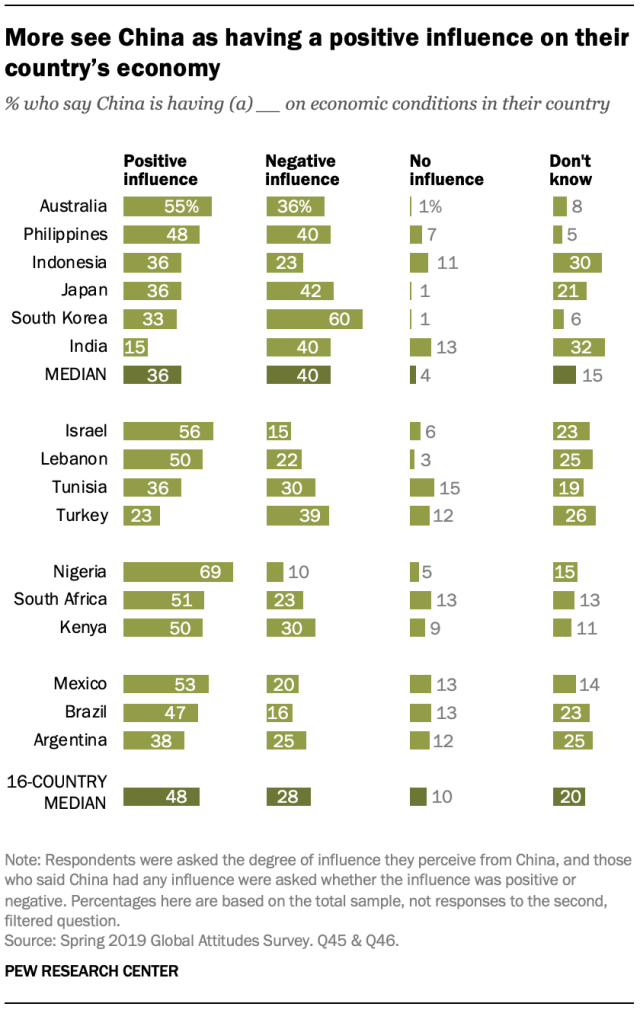
eople who said that China or the U.S. had at least some influence on economic conditions of their country were also asked to rate that influence as either positive of negative.
In Asia-Pacific countries, evaluations of Chinese influence are fairly divided; Australians, Filipinos and Indonesians are more likely to see Chinese influence as positive than negative, while Japanese, South Koreans and Indians identify Chinese influence as more negative than positive.
Opinions in the Middle East and North Africa are also conflicted. Those in Israel and Lebanon are much more likely to see the Chinese impact on economic conditions in their country as positive. Tunisians also see Chinese influence as more positive than negative, but by a smaller margin. Turks more frequently see Chinese influence negatively.
Opinions elsewhere are more clear-cut. Majorities in the sub-Saharan African countries surveyed say Chinese influence is positive, especially in Nigeria, where about seven-in-ten hold this opinion. About four-in-ten or more see Chinese influence positively in the Latin American nations surveyed as well.
Substantial minorities in most countries did not offer any opinion of China’s influence.
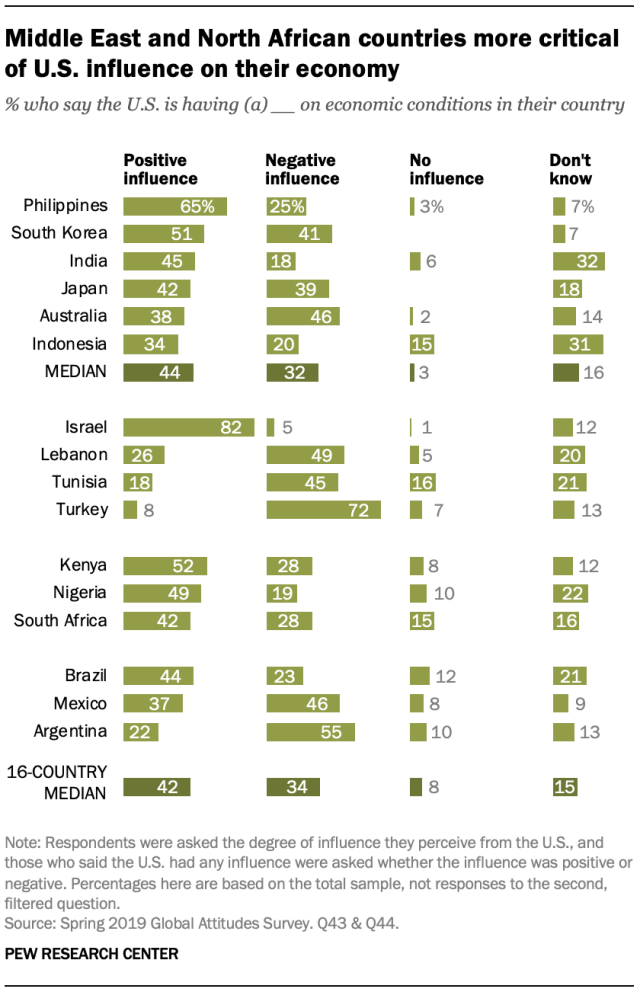
When it comes to American influence, evaluations are somewhat less positive; a median of 42% rate it positively, while 34% say the U.S. is having more of a negative influence on economic conditions in their country.
Those in the Asia-Pacific region are more likely than not to describe U.S. economic influence in their country in positive terms. This is most true in the Philippines, where 65% say the U.S. is having a positive influence on their economic conditions and 25% say the U.S. is having a negative influence – a difference of 40 percentage points. Indians, Indonesians and South Koreans are also much more likely to see the U.S. influence as positive than negative. Only in Australia do more say the U.S. has a negative influence (46%) than a positive one (38%). Japanese are relatively divided on the issue, with 42% citing positive influence and 39% negative.
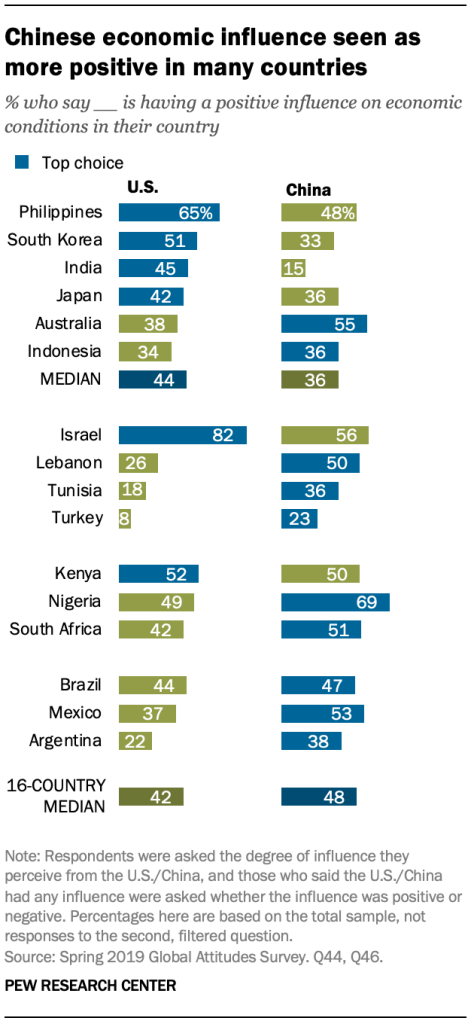
Across the Middle East and North African countries surveyed, most publics are more likely to see U.S. economic influence unfavorably, even as Israelis almost uniformly describe America’s role as good (82% positive). In Turkey especially, about three-quarters say the U.S. has a negative influence on their domestic economic conditions. Those in Lebanon and Tunisia are at least 20 points more likely to see the influence as negative.
More in the three sub-Saharan countries surveyed say the U.S. has a positive economic influence than say it has a negative influence. Still, substantial minorities of around one-in-five or more describe it negatively. And opinion is mixed in the three Latin American countries surveyed, with Brazilians largely describing the American role favorably (44%) and Argentines and Mexicans saying the opposite (55% and 46% negative, respectively).
When directly comparing the perceived positive influence from the U.S. and China, outside of the Asia-Pacific region, Chinese economic influence is largely seen in more positive terms than American influence. For example, across three of the Middle East and North African countries surveyed, people are substantially more likely to describe China’s role in their economy in positive terms than they are America’s role. In Lebanon, about twice as many say China is having a good influence (50%) than say the same of the U.S. (26%). Most in sub-Saharan Africa and Latin America, too, describe Chinese influence positively, even as substantial numbers in most countries also see U.S. influence positively.
But, in much of the Asia-Pacific region, people are more likely to evaluate the U.S. economic influence positively than the Chinese, or at least to see them comparably. Only in Australia and Indonesia do more say China’s influence is good than say the same about the U.S. But, in Indonesia, China’s influence is seen more positively by a very thin margin.
Favorable views of Chinese economic influence are more common among those who think their country has good economic ties with China and those who prefer a close economic relationship to China. Those who feel similarly toward the U.S. are also more likely to see U.S. economic influence as good.
Most say current economic relations with both China and U.S. are good
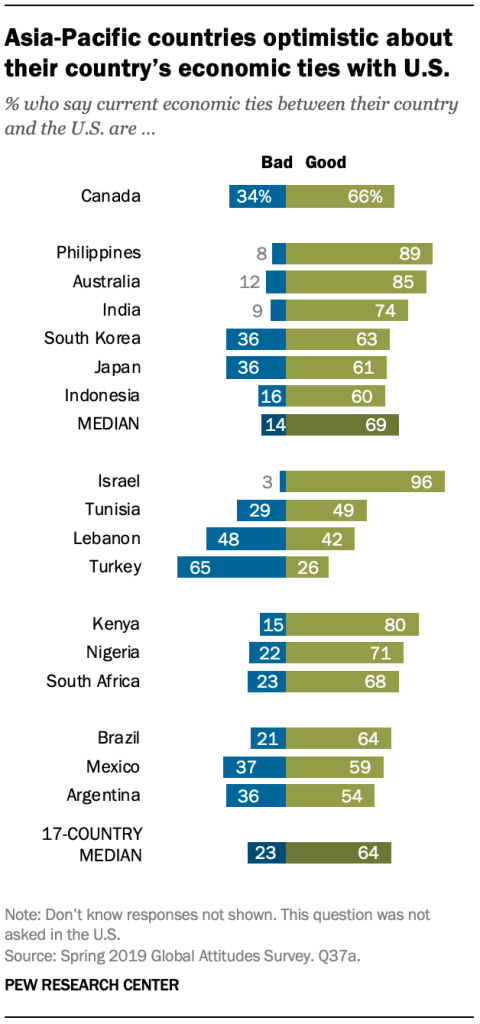
When it comes to the current state of economic relations with China, publics are much more likely to describe them as good (median of 66%) than bad (21%). Outside of Canada, the U.S. and some of the Asia-Pacific countries surveyed, around half or more in every other country see current economic ties positively.
In the wake of major trade disputes and political tensions with China, around half in both the U.S. and Canada describe current bilateral economic relations as poor. In South Korea and Japan, too, 66% and 51%, respectively, say relations are negative.
In the Middle East and North Africa, majorities in all except Turkey say the economic relationship between their country and China is going well. Even in Turkey, about half say the relationship is positive.
Likewise, majorities in the sub-Saharan African and Latin American countries surveyed also rate their economic relationship with China positively.
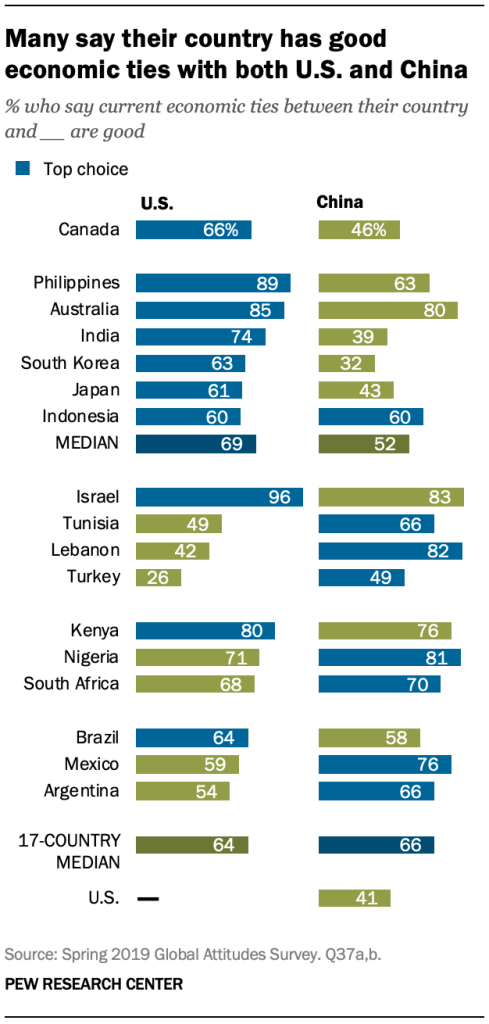
Most also say current economic relations with the United States are going well; a median of 64% say relations are in good shape, compared with 23% who say the opposite.
This sense is highest among Israelis, 96% of whom say American-Israeli economic ties are positive. The other Middle East and North African countries surveyed are the only countries where fewer than half say relations are currently positive. This is especially true in Turkey, where about two-thirds said economic ties between their country and the U.S. were bad, even before the U.S. imposed new sanctions on Turkey in October.
Across the Asia-Pacific region, six-in-ten or more in each country say their economic ties to the U.S. are currently good. Around three-quarters or more take this position in India (74%), Australia (85%) and the Philippines (89%).
Attitudes in the sub-Saharan African countries surveyed are also positive, with roughly seven-in-ten or more in each country saying relations are positive. Opinions in the Latin American countries surveyed are similar, though less effusive; fewer than two-thirds in all three countries say their economic ties with the U.S. are positive, and substantial minorities say the ties are bad.
Canadians also have tempered evaluations, with about two-thirds saying that ties are good and about a third disagreeing.
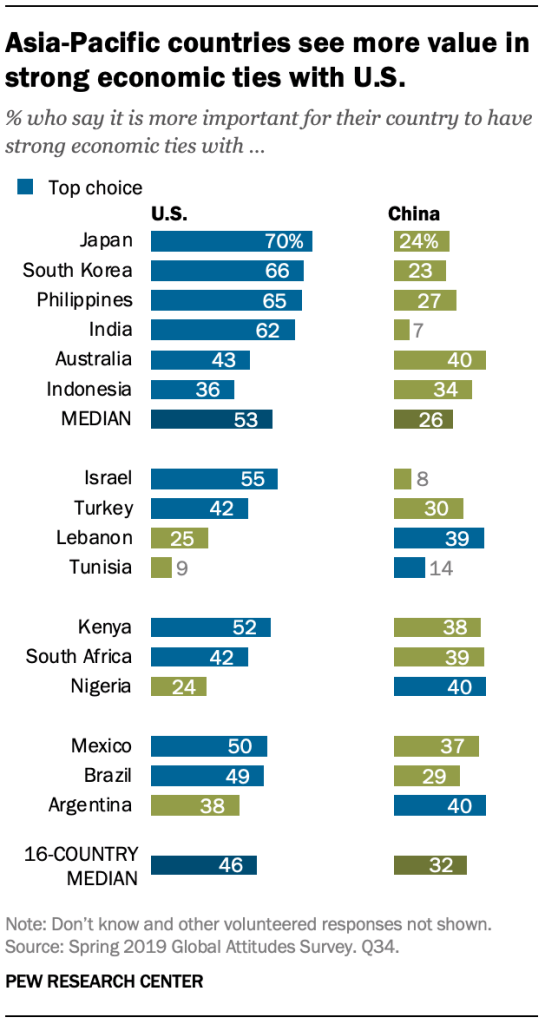
And, when comparing economic ties to the U.S. and to China, many publics have a sanguine view of their current economic relationship with both superpowers. More than two-thirds in each of the sub-Saharan African countries surveyed describe current economic ties with both China and the U.S. as good, and around half or more say the same in each of the Latin American countries surveyed.
In the Asia-Pacific region, ties with the U.S. are more frequently rated as good in India, South Korea and Japan. Majorities in those countries see economic relations with the U.S. positively, while only minorities say the same of China. The difference is especially pronounced in India, where nearly three-quarters say they have a good economic relationship with the U.S. and about four-in-ten say the same about China, a difference of 35 percentage points.
This pattern is reversed in the Middle East and North Africa, where all publics but Israel rate their economic relationships with China more positively. This is especially true in Lebanon, where there is a 40-point difference between the share who say their ties with the U.S. are good and the share who say ties with China are good. Only in Israel do more say ties to the U.S. are good, and even there, eight-in-ten still see their economic ties with China positively.
Stronger economic ties to U.S. preferred

Sixteen publics were asked whether they prefer stronger economic ties with the U.S. or China. On balance, more prefer for their country to have closer relations with the U.S. (a median of 46%) than China (32%). Opinions are unified in the Asia-Pacific countries surveyed, with greater shares in all six preferring strong U.S. economic ties. Those in Japan, South Korea, the Philippines and India especially prefer ties with the U.S.; they are more likely to choose relations with the U.S. over China by about 40 percentage points or more. For Australians and South Koreans, this year’s results are a reversal from opinions in 2015, when more preferred strong economic ties with China.
For the four Middle East and North African countries surveyed, opinions are mixed. Those in Turkey and Israel say strong ties with the U.S. are more important, and those in Lebanon and Tunisia say close economic ties with China are more important. Still, substantial minorities in Lebanon and Israel volunteer that strong ties with both are more important, and about two-thirds in Tunisia say the same.
In the sub-Saharan African countries surveyed, only those in Nigeria would rather have strong economic ties with China than with the U.S. About three-in-ten in Nigeria also volunteer that strong ties with both are more important. Argentines are the only public of the three Latin American countries surveyed that chooses ties with China over ties with the U.S., though by only a 2-point margin.
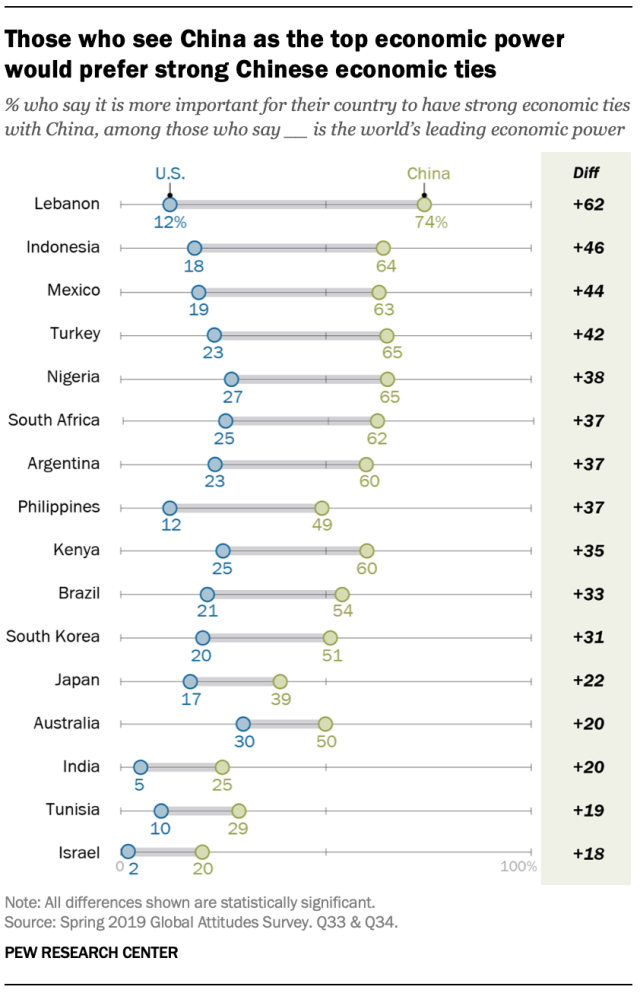
Preferences for strong economic ties with the U.S. or China differ based on perceptions of economic power. Those who say China is the world’s leading economic power are more likely to prefer strong economic ties with China, and vice versa. In Lebanon, for example, those who say China is the world’s leading economic power are 62 percentage points more likely than those who think the U.S. is the top economy to want strong economic ties with China.
Likewise, those with favorable views of China are more likely to choose strong economic ties with China in most countries. Favorable views of Chinese investment and China’s growing military power are also tied to a preference for ties with China.
Attitudes toward China
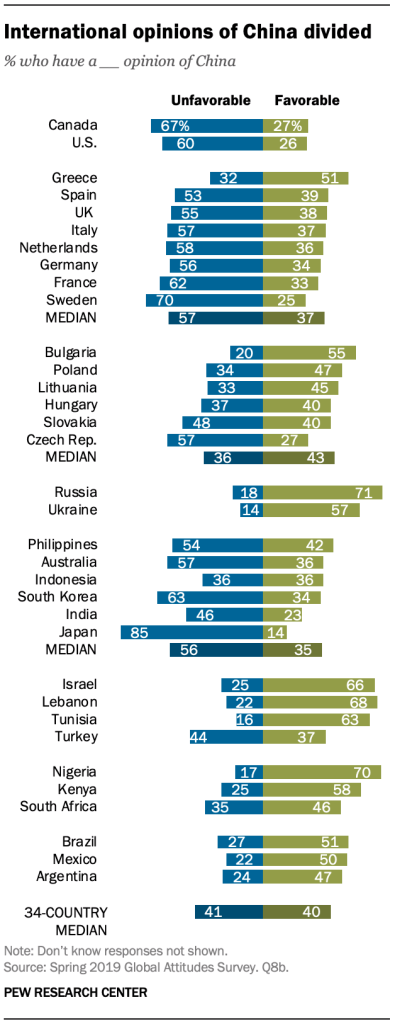
Around the globe, people are divided in their opinions of China. A median of 40% across 34 countries surveyed have a favorable view of China, while a median of 41% have an unfavorable opinion. The country’s most positive ratings come from Russia (71% favorable), Nigeria (70%) and Lebanon (68%). The most negative views are found in Japan (85% unfavorable), Sweden (70%) and Canada (67%). (For more information on global views of China, see “People around the globe are divided in their opinions of China.”)
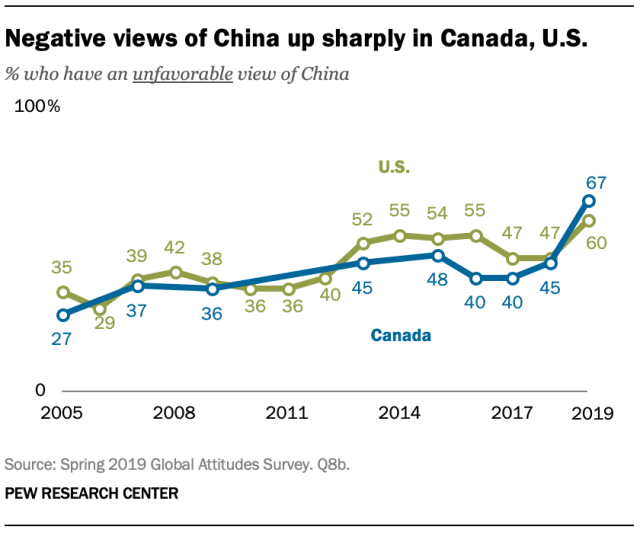
In Canada and the United States, the increase in unfavorable views this year represents the largest year-over-year change since the question was first posed in 2005. In Canada, unfavorable opinions increased 22 percentage points in the wake of the high-profile arrest of technology company Huawei’s chief financial officer and the ensuing Chinese detainment of two Canadian nationals who still remain in Chinese custody, while in the U.S. unfavorable opinions increased 13 points.
Age is a factor in how people view China. In 19 countries, those ages 18 to 29 are more likely than those ages 50 and older to hold a favorable view of China.
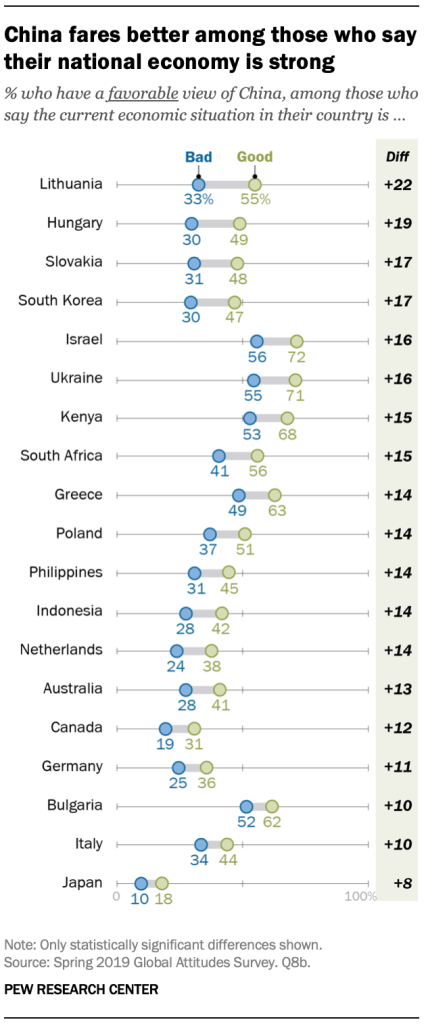
In 19 countries, those who say their national economic situation is good have a more positive outlook on China. In Lithuania, 55% of those who grade their economy as good have a favorable view of China; just 33% of those who say the economy is in poor shape share that opinion, a 22-point gap. Similarly large differences exist in Hungary (19 points), Slovakia (17), South Korea (17), Israel (16), Ukraine (16), Kenya (15) and South Africa (15).
Views of China tend to be most negative in countries with the highest per capita gross domestic product, including the U.S., Netherlands, Sweden and Germany. At the opposite end of the spectrum, countries with lower GDP per capita are less negative – including Kenya, Nigeria, Ukraine and Tunisia. Japan stands out as being much more negative toward China than other nations with similar levels of wealth, and this may be partially attributed to long-standing historical grievances between the two nations.
The relationship between GDP per capita and unfavorable views of China may be due in part to the relative political freedoms in these countries, as views of China are also closely related to citizens’ enjoyment of their rights. Previous Center research on China illustrated a strong relationship between global views of China and perceptions about the state of civil liberties domestically for Chinese citizens, and a similar pattern continues beyond China’s borders. Countries whose citizens have more freedoms, as measured by Freedom House, tend to have less favorable views of China. For example, Russia’s aggregate Freedom House score is 20 on a 100-point scale, the lowest among the countries included in the survey, but Russians give China the highest favorable rating (71%). On the opposite end of the spectrum, Sweden receives a perfect 100 from Freedom House, while just 25% of Swedes have positive views of China.
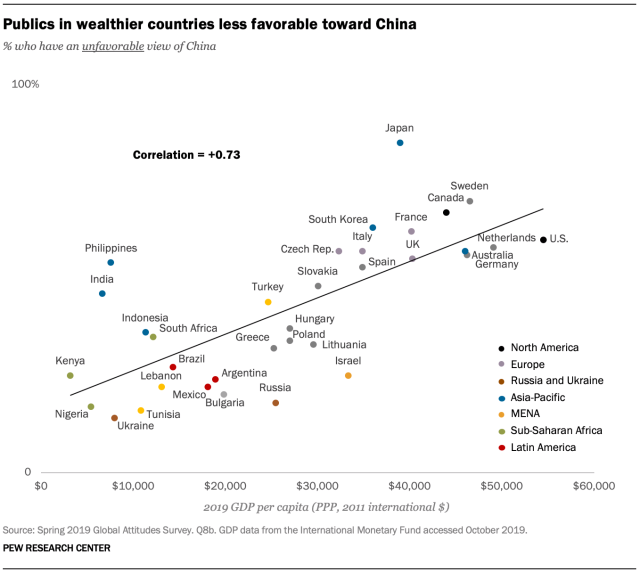
Similarly, the higher a country’s perceived level of corruption, as designated by Transparency International, the more favorably that nation tends to view China. Nigerians, for instance, fare the worst on the corruption scale among the countries included in this survey. Meanwhile, 70% of Nigerians have a favorable view of China, second only to Russians. But both the level of civil liberties and corruption within a country closely track with overall GDP per capita.
In contrast, investment from China is only weakly related to views of China across the countries included in this survey. Despite pouring hundreds of billions of dollars into the Belt and Road Initiative, especially in emerging economies, the size of capital investments or construction contracts funded by Beijing in a country is only weakly related to that country’s overall views of China. Indonesia, for example, has received more than $47 billion for capital investment and construction projects from China since 2005, but attitudes toward China in the country are split evenly, with 36% favorable and 36% unfavorable. On the other hand, China has sent Nigeria $44 billion in the same time, and 70% of Nigerians view China favorably.
Countries that receive more exports from China tend to have more negative views of China, though this measure is also strongly associated with GDP per capita. The U.S. and Japan receive the most exports from China among the countries surveyed, and they also have much more negative views of China overall. And while Lebanon, Tunisia and Bulgaria receive relatively few Chinese exports, majorities in these countries view China in a positive light.
Economic ties with China welcomed in many emerging markets, but some concerns over Beijing’s influence
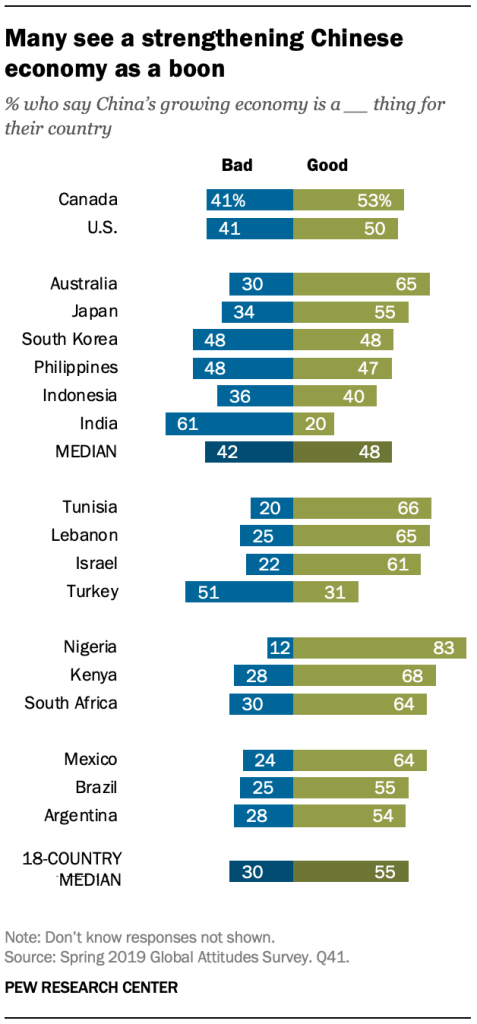
Across 18 countries, more people think China’s growing economy is a good thing than a bad thing for their country. Overall, a median of 55% see benefits to a strong Chinese economy; 30% say it is bad for their country.
More Canadians and Americans see themselves benefiting from China’s economy than not, though 41% in both countries think this is negative. Majorities in Australia and Japan think a strong economy is mutually beneficial. South Korea, the Philippines and Indonesia have relatively mixed views. A majority of Indians, however, see a growing Chinese economy as a bad thing for their country – the most among all of the publics surveyed.
A majority of Israelis and pluralities of Lebanese and Tunisians believe they benefit from China’s growing economy.
Throughout Africa and Latin America, most say China’s growing economy is a good thing for their country. This ranges from 83% in Nigeria to 54% in Argentina.
And in nine countries, thinking your own national economy is doing well also relates to more positive views of China’s economic growth. Indonesia and the Philippines have the most dramatic differences; people who think their country’s economy is in good shape are more likely to see China’s economic growth positively by 21 and 19 points, respectively.
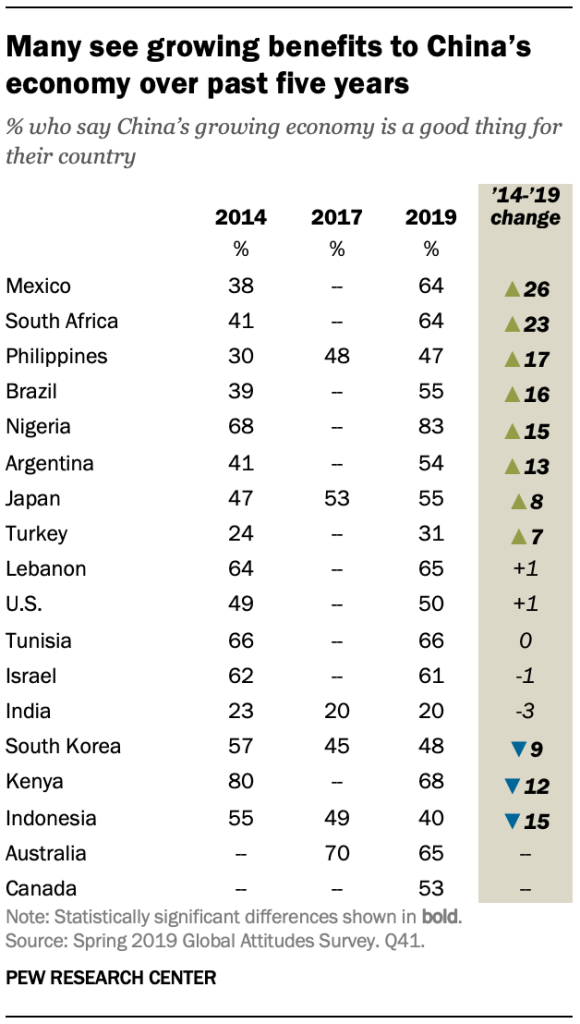
In many emerging economies, more people today are saying China’s growing economy is a good thing for their nation compared with five years ago. Double-digit increases have taken place in Mexico, South Africa, the Philippines, Brazil, Nigeria and Argentina.
On the other hand, South Koreans, Kenyans and Indonesians are now less likely to see benefits to China’s growing economy than they were five years ago. Still, sizable portions continue to say China’s economy benefits them in each of these three countries.
Attitudes have remained fairly steady on this question in Lebanon, the U.S., Tunisia, Israel and India.
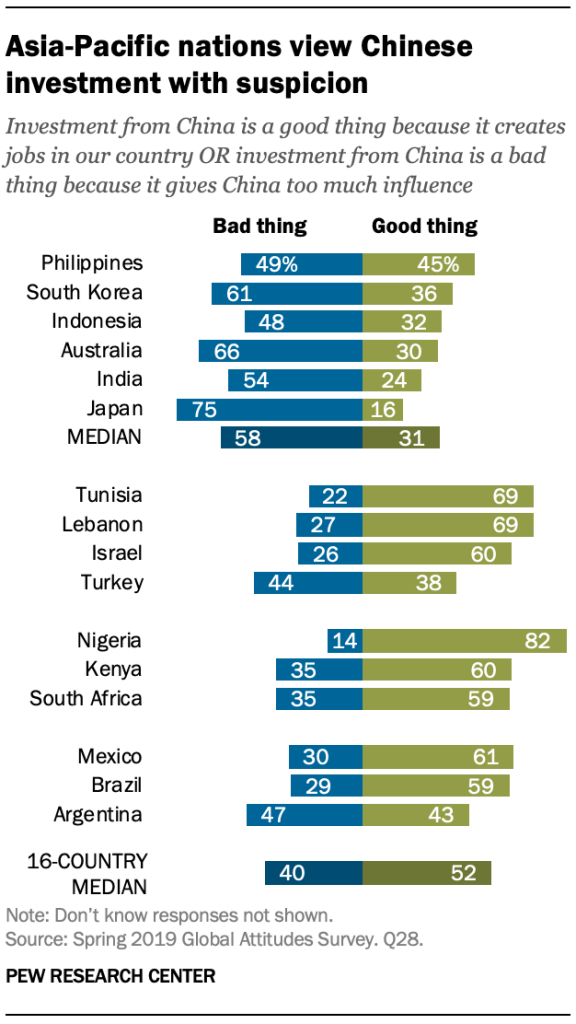
When asked specifically about whether investment from China is good because it creates jobs in countries or bad because it gives China too much influence, a median of 52% regard Chinese investment as a net positive.
Outside of the Asia-Pacific, investment from China is seen as a good thing in the receiving country. About six-in-ten or more welcome Chinese investment in Nigeria, Tunisia, Lebanon, Mexico, Israel, Kenya, South Africa and Brazil. Turkey and Argentina show more ambivalence, with no clear consensus on whether Chinese investment in their country is a good or bad thing.
Among China’s neighbors, most view investments from China with skepticism. Roughly half or more in each Asia-Pacific nation surveyed say Chinese investment is a bad thing because it gives China too much influence. This ranges from 75% of Japanese to 48% of Indonesians.
Few see China’s growing military benefiting their country
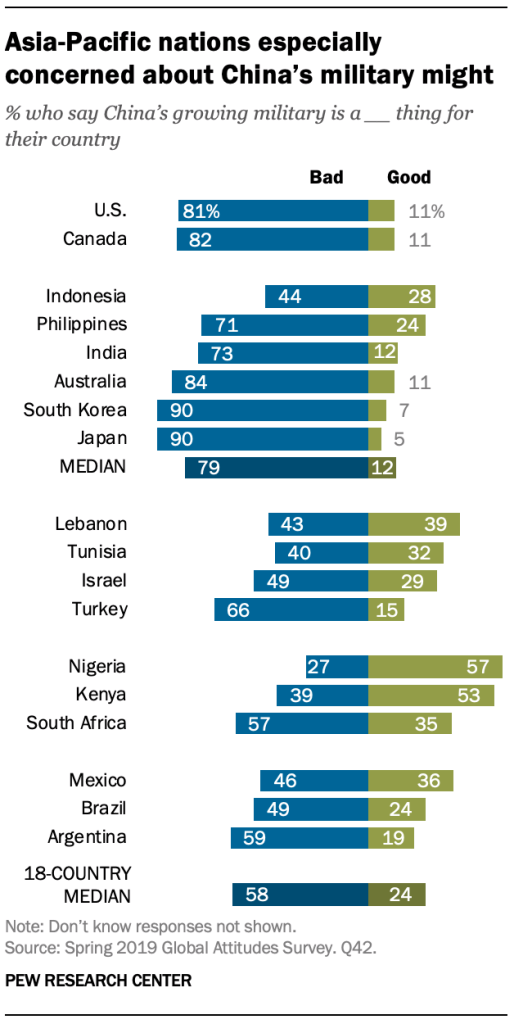
While most countries see strong Chinese economic growth benefiting their country, this is not the case when it comes to a growing Chinese military. Across 18 countries, a median of 58% think increased Chinese military strength is bad for them; 24% think this could be a good thing.
China’s Asia-Pacific neighbors are especially doubtful about the effects of a strong Chinese military on their country: Among the six countries surveyed in the region, a median of 79% say China’s growing military might is bad for their country. This is especially true in Japan and South Korea, where nine-in-ten hold this opinion.
This worry extends across the Pacific: Roughly eight-in-ten in the U.S. and Canada see China’s growing military as a bad thing for their country.
Likewise, more in Latin America and the Middle East and North Africa do not see benefits to their own nation when it comes to a growing Chinese military than do. South Africa also follows that trend. However, more than half in Nigeria and Kenya believe their country benefits from increasing Chinese military strength.
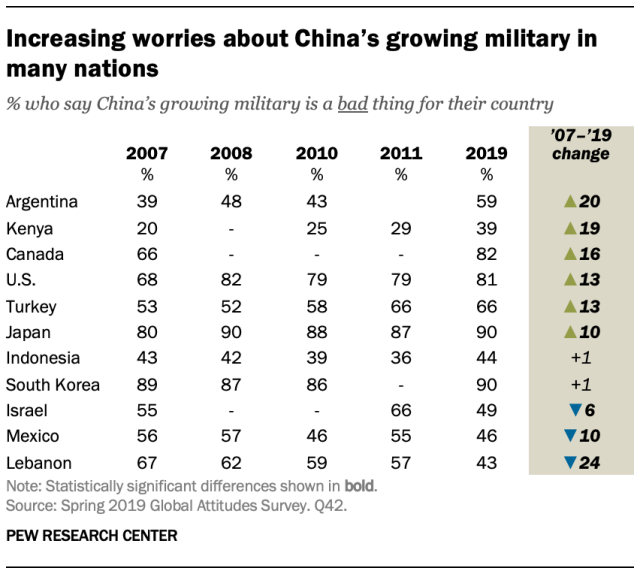
The U.S. and Canada have become more negative about China’s growing military since 2007. Previously, about two-thirds said the growing military was bad, but now about eight-in-ten say so. Those in Argentina, Kenya, Turkey and Japan have also become increasingly negative.
On the other hand, those in Lebanon have become less negative about China’s growing military, going from 67% saying it was bad to only 43% saying it is bad. Israelis and Mexicans have similarly become less negative.
Little confidence in President Xi, particularly in neighboring countries
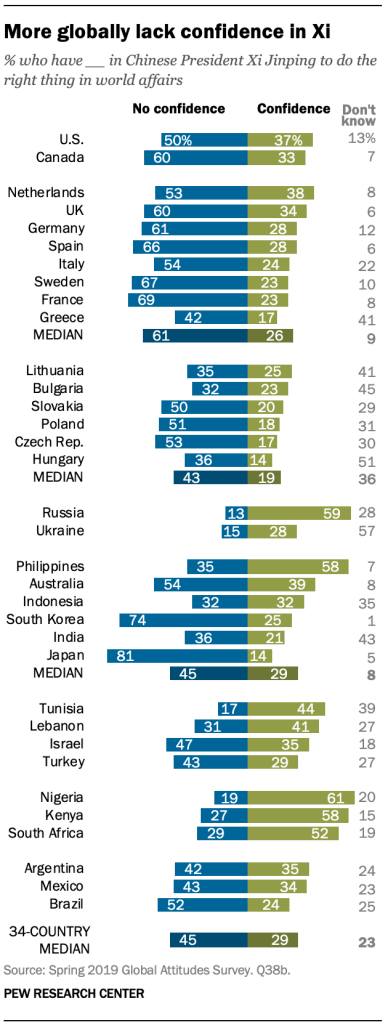
Views of Chinese President Xi Jinping vary greatly across the 34 surveyed countries, but a median of 45% say they lack confidence in the Chinese leader when it comes to world affairs. A median of 29% voice confidence in Xi, while 23% do not offer an opinion.
Six-in-ten Canadians and half of Americans give negative marks to Xi. In Western Europe, a median of 61% say they lack confidence. This includes majorities in France, Sweden, Spain, Germany and the UK. While 38% in the Netherlands give Xi a vote of confidence, more than half (53%) have doubts.
Those in Central and Eastern Europe also tend to lack confidence in Xi, though he is relatively unknown across the region with more than a quarter in each country giving no opinion. Half or more in the Czech Republic, Poland and Slovakia have negative opinions of Xi. Only in Russia does Xi get positive marks, with 59% voicing confidence.
Outside of Europe, Xi’s image is more mixed. In the Asia-Pacific countries surveyed, a majority of Filipinos offer a vote of confidence in the Chinese leader. But some of China’s other neighbors are more negative, with most Japanese (81%), South Koreans (74%) and Australians (54%) saying they do not have confidence in him.
Among those who offer an opinion, more in Tunisia and Lebanon have confidence in Xi.
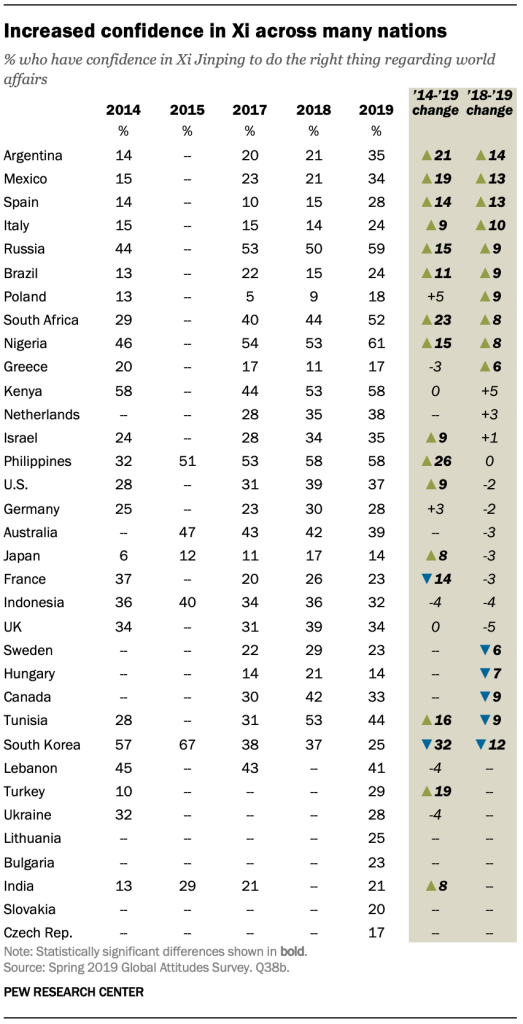
Israel and Turkey show the opposite pattern, with more saying they lack confidence.
About half or more in the three African countries surveyed hold positive views of Xi when it comes to world affairs. This includes 61% in Nigeria, one of China’s largest investment partners on the African continent.
Positive views of Xi have increased across several countries, both in the past year and since 2014. Significant, double-digit increases in confidence toward the Chinese leader since 2018 have occurred in Argentina, Mexico, Spain and Italy. When going back to 2014, Xi fares even better, gaining 15 points or more in the Philippines, South Africa, Argentina, Mexico, Tunisia, Russia and Nigeria.
Confidence in Xi has declined over the past year in Sweden, Hungary, Canada, Tunisia and South Korea. South Korea stands out among other countries as the only place where views of Xi have decreased significantly in both the past year and the past five years, with those saying they are confident in the Chinese leader decreasing by 32 percentage points over that period. While Tunisia shows a one-year dip, confidence in Xi is generally up since 2014.
Japanese confidence in Xi has risen since 2014, but still, only 14% of the public say they trust him to do what’s right in world affairs – the lowest level among the nations surveyed.
When looking at other leaders across Asia, Xi fares relatively less well among the Asia-Pacific publics surveyed. A median of 50% across these six nations have confidence in Japan’s Shinzo Abe when it comes to world affairs, and India’s Narendra Modi is close behind with 48%. Xi trails them with 29% confidence, though he beats out North Korea’s Kim Jong Un, who garners a median of 23% confidence. Filipinos stand out for their enthusiasm toward Xi: 58% have confidence in the Chinese leader.
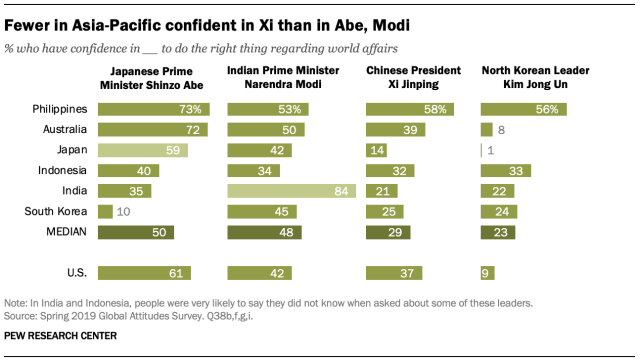
In India and Indonesia, though, Xi’s notoriety remains limited; upwards of a third in each country do not offer a response when asked about him (or, indeed, when asked about any Asian leader with the exception of Prime Minister Modi in India). But, on balance, more in India lack confidence in Xi (36% no confidence vs. 21% confidence, 43% don’t know), and Indonesians are evenly split (32% no confidence, 32% confidence, 35% don’t know).
Fewer Americans voice confidence in Xi than say the same of leaders from other Asian nations, including Abe (61% confidence) and Modi (42% – though a third of Americans offer no opinion). However, many more think Xi will do the right thing regarding world affairs than North Korean leader Kim Jong Un, in whom a mere 9% of Americans have confidence.
Originally published by Pew Research Center, 12.05.2019, reprinted with permission for non-commercial, educational purposes.
